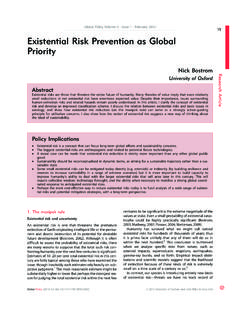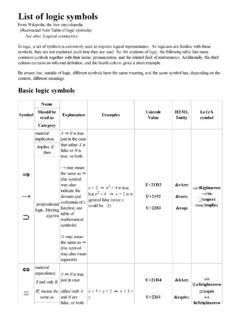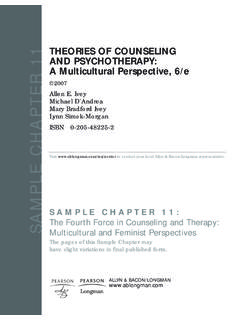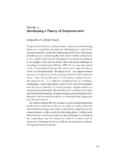Transcription of A commentary on the epistle of James
1 1 existential Christianity A commentary on the epistle of James A commentary on the epistle of James Introduction Since the birth of the Protestant movement, the epistle of James has endured an unfortunate reputation among many Christians. This rough treatment can in fact be traced as far back as the second century, when the Muratorian Canon neglected to list James as an accepted canonical work of early Christian literature. Several writers in the fourth century also labelled the epistle as a disputed' work, which indicated that it was a matter of contention whether the letter was valuable enough to be part of the canon. Nevertheless, the most likely factor that has led to the present state of neglect is the words of Martin Luther himself. In his preface to his discussion on the books of James and Jude, Luther outlines a number of reasons why he considers the epistle of James to be at the very least inferior to every other book in the New He argues that James ascribes justification to works, and on that reason alone is against the entirety of Scripture and proves that the epistle was not written by an apostle.
2 Furthermore, Luther argues that the essence and definition of Christianity found in James is devoid of key concepts; specifically the death, resurrection, and the spirit of Christ. In other works, Luther states that the epistle had "nothing of the nature of the gospel about it", and that compared to Paul and Peter this book is "an epistle of straw". It is highly probable that many Protestants today are unaware of how critical their branch's founder was towards this particular book of the Bible, but I believe the evolution of ideas and doctrinal discipline' in Protestant thought has nevertheless prevented a thoughtful study and consideration of the work. Indeed, it will be demonstrated that James has been shunted solely for coming down on the wrong side of a certain debate in the history of the Christian Church.
3 As with the parts of the Gospels before the crucifixion, Christianity today has responded to a part of the New Testament that contradicts a specific interpretation of 1. The preface can be found in Luther's Works, vol. 35, 2010 Timothy Neal, All Rights Reserved 2 existential Christianity A commentary on the epistle of James Pauline theology by ignoring it (or at least interpreting it in such a contrived manner that its meaning is distorted). The most profound claim made by Luther was that the epistle of James is starkly dissimilar to the nature of the Gospel.' This claim implies that while the epistles of Paul and Peter follow a natural progression from the message of the Gospels, James stands alone in his thoughts and conceptions of Jesus and God. In my teenage years I will confess to considering the epistle of James my favourite non- Gospel book of the New Testament.
4 I was surprised to read the various attacks on it from a number of highly respected figures in Christian history, but upon further reflection it is entirely consistent with the way in which Christianity has often sought to pervert the original message of Jesus. It is claimed by Luther that this epistle is the most dissimilar to the message of Jesus than any other book in the New Testament, but that is not true. In fact, it is quite easy to demonstrate that this epistle shares far more similarities to the words of Jesus than either Paul or Peter. This is not to say that the letters of Paul and Peter are of little use (as Luther goes on to argue regarding James ), but rather that the letter of James is such an amazing work of early Christian literature that it deserves a careful and open- minded study.
5 James Chapter 1. The origin of the letter of James is enough to make the study of it worthwhile. After the Gospels, the New Testament is filled with epistles that are predominantly addressed to churches that are outside Israel and mostly inhabited by Gentiles. Accordingly, when Paul discusses problems unique to the recipient church he is discussing problems associated with Gentile churches in general. As Paul established these churches and taught them about Jesus and Judaism, the theology and issues of the church are not necessarily representative of the early Christian movement as a whole. What is missing from these letters is an understanding of the many Christian communities that grew in Israel. Not only were these churches numerous, they represent branches of the early Christian movement that were often at odds with the Gentile Pauline churches ( the Ebionites).
6 A letter of James , being 2010 Timothy Neal, All Rights Reserved 3 existential Christianity A commentary on the epistle of James a prominent Jewish Christian, gives readers today an insight into the more Jewish forms of early Christian thought. It will not be outlined here, but there is considerable evidence to suppose that James was addressing his letter to an audience that contained a majority of Jewish The first chapter sets the tone of the rest of the epistle , and establishes the letter as a piece of early Christian wisdom Wisdom literature has a strong tradition in Judaism ( Proverbs), and there are many Jesus scholars that argue that the majority of the content within the Synoptic Gospels can be viewed within the wisdom genre. James 1:2- 8 elucidates two common themes in early Christian thought: enduring pain and being single- minded.
7 For James , Peter, Paul, John, and Jesus himself, it was vitally important for any follower of Jesus to understand that possessing (and spouting) such subversive views in Jewish or Gentile societies will likely result in persecution. Indeed, considering the constraint placed on Christians not to arm or defend themselves from this persecution, the required level of endurance was high. One obvious example of this occurring is the persecution of Roman Christians at the hands of Nero. Disturbingly described by Tacitus, the victims of this persecution were often tortured and killed in horrible ways. So disturbing it was it led the author of the book of Revelations to call Nero the beast; or antichrist. There are a number of other historical examples that give the impression that suffering was an ever present threat to a number of early Christian communities.
8 Accordingly, writers felt the need to encourage their brethren to endure, and promised them rewards for doing so ( James 1:12, compare this with the words of Jesus in Matthew 10:22). James 1:9-11 can be seen as a further expression of a theme that was quite important to Jesus, yet mostly absent in the letters of Paul. James extols the value of humility, and belittles the archetype 'rich man' who will fade away in time. Verse 11 demonstrates the poetic side of James , and the few verses share strong similarities with a few key sayings of 2. see: Paul Achtemeir, Joel Green, and Marianne Thompson, The New Testament: its literature and theology, Eerdmans Publishing Company 2001. 3. Bear in mind, however, that chapters were artificially imposed on manuscripts. 2010 Timothy Neal, All Rights Reserved 4 existential Christianity A commentary on the epistle of James This passage not only prepares the ground for a strong critique of the wealthy later in the epistle , but also emphasises the fleetingness of the earthly existence.
9 As Jesus explained several times in the Gospels, earthly possessions are ultimately of very little significance. The imagery James utilises is reminiscent of the famous acclamation of Ecclesiastes 3:20 that All came from the dust, and all return to the dust.'. Like Jesus, in 1:19-20 James discusses the importance of abandoning anger for the life of a follower of Jesus. Again like Jesus, in 1:14-15 he does the same with lust. Indeed, throughout the epistle it is hard not to get the sense that James shares a great similarity with Jesus over personal morality. Of course this similarity is also shared with Paul and Peter, yet it does demonstrate another area that James can be viewed as a direct continuation of the message of Jesus contained within the Gospels. The rest of the chapter builds up to a climatic conclusion.
10 It is an extraordinary verse that is worth directly quoting: Pure and undefiled religion in the sight of our God and Father is this: to visit orphans and widows in their distress, and to keep oneself unstained by the world. ( James 1:27). For our contemporary context, the venom in this verse is how starkly dissimilar it is to any mainstream definition of Christianity. This may have been the case in the time it was written as well, as Paul seemingly presents a version of pure and undefiled religion that emphasises different ideals. I suspect it is one of the reasons that Luther had such a lowly view of James (for the second reason see chapter 2), as he preferred the Pauline perspective. It is this verse that is at the heart of the James ' conception of Christian thought: maintain personal purity and fulfil the law.








